51878 results in International relations and international organisations
Table of Cases
-
- Book:
- Legal Problems of International Organizations
- Published online:
- 15 February 2024
- Print publication:
- 22 February 2024, pp xxxiii-xxxiv
-
- Chapter
- Export citation
Copyright page
-
- Book:
- International Courts versus Non-Compliance Mechanisms
- Published online:
- 15 February 2024
- Print publication:
- 22 February 2024, pp vi-vi
-
- Chapter
-
- You have access
- Open access
- HTML
- Export citation
Preface
-
- Book:
- Regional Politics in Oceania
- Published online:
- 15 February 2024
- Print publication:
- 22 February 2024, pp xi-xiv
-
- Chapter
- Export citation
LAR volume 59 issue 1 Cover and Front matter
-
- Journal:
- Latin American Research Review / Volume 59 / Issue 1 / March 2024
- Published online by Cambridge University Press:
- 21 February 2024, pp. f1-f3
-
- Article
-
- You have access
- Open access
- Export citation
Palmer-Rubin Brian. (2022). Evading the Patronage Trap. Interest Representation in Mexico. Ann Arbor: University of Michigan Press. Illustrations, bibliography, index, appendices, 323 pp.; hardcover US$90.00, paperback US$42.95, read online with open access
-
- Journal:
- Latin American Politics and Society / Volume 66 / Issue 3 / August 2024
- Published online by Cambridge University Press:
- 20 February 2024, pp. 207-210
-
- Article
-
- You have access
- HTML
- Export citation
The perceived legitimacy of deliberative minipublics: taking the perspective of polarized citizens – CORRIGENDUM
-
- Journal:
- European Political Science Review / Volume 16 / Issue 2 / May 2024
- Published online by Cambridge University Press:
- 16 February 2024, p. 315
-
- Article
-
- You have access
- Open access
- HTML
- Export citation
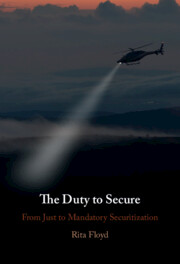
The Duty to Secure
- From Just to Mandatory Securitization
-
- Published online:
- 15 February 2024
- Print publication:
- 22 February 2024
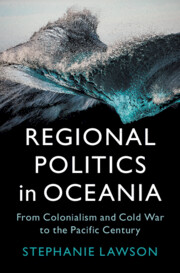
Regional Politics in Oceania
- From Colonialism and Cold War to the Pacific Century
-
- Published online:
- 15 February 2024
- Print publication:
- 22 February 2024
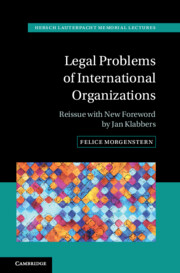
Legal Problems of International Organizations
- Reissue with New Foreword by Jan Klabbers
-
- Published online:
- 15 February 2024
- Print publication:
- 22 February 2024
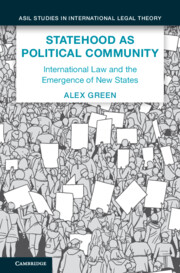
Statehood as Political Community
- International Law and the Emergence of New States
-
- Published online:
- 15 February 2024
- Print publication:
- 22 February 2024
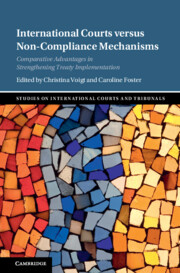
International Courts versus Non-Compliance Mechanisms
- Comparative Advantages in Strengthening Treaty Implementation
-
- Published online:
- 15 February 2024
- Print publication:
- 22 February 2024
-
- Book
-
- You have access
- Open access
- Export citation
Conclusion
-
- Book:
- Three Faces of Sun Tzu
- Published online:
- 07 March 2024
- Print publication:
- 15 February 2024, pp 491-521
-
- Chapter
- Export citation
List of Abbreviations for Frequently Cited Works
-
- Book:
- Three Faces of Sun Tzu
- Published online:
- 07 March 2024
- Print publication:
- 15 February 2024, pp xxi-xxiv
-
- Chapter
- Export citation
Author’s Note on Online Annex
-
- Book:
- Three Faces of Sun Tzu
- Published online:
- 07 March 2024
- Print publication:
- 15 February 2024, pp xvi-xvii
-
- Chapter
- Export citation
C - Strategist Should Find Advantage
-
- Book:
- Three Faces of Sun Tzu
- Published online:
- 07 March 2024
- Print publication:
- 15 February 2024, pp 171-234
-
- Chapter
- Export citation
Introduction
-
- Book:
- Three Faces of Sun Tzu
- Published online:
- 07 March 2024
- Print publication:
- 15 February 2024, pp 1-22
-
- Chapter
- Export citation
Figures
-
- Book:
- Three Faces of Sun Tzu
- Published online:
- 07 March 2024
- Print publication:
- 15 February 2024, pp x-x
-
- Chapter
- Export citation
E - Strategist Should Make a Situation’s Natural Dynamics Work for Her
-
- Book:
- Three Faces of Sun Tzu
- Published online:
- 07 March 2024
- Print publication:
- 15 February 2024, pp 298-356
-
- Chapter
- Export citation
Index B
-
- Book:
- Three Faces of Sun Tzu
- Published online:
- 07 March 2024
- Print publication:
- 15 February 2024, pp 523-534
-
- Chapter
- Export citation
A - Strategist Should Be Calculating
-
- Book:
- Three Faces of Sun Tzu
- Published online:
- 07 March 2024
- Print publication:
- 15 February 2024, pp 54-109
-
- Chapter
- Export citation

